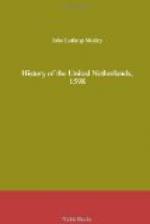illustration of this degradation of labour and of
its results, that in the reign of Philip twenty-five
thousand individuals of these dishonoured and comparatively
industrious classes, then computed at four millions
in number in the Castilian kingdoms alone, had united
in a society which made a formal offer to the king
to pay him two thousand dollars a head if the name
and privileges of hidalgo could be conferred upon
them. Thus an inconsiderable number of this
vilest and most abject of the population—
oppressed by taxation which was levied exclusively
upon the low, and from which not only the great nobles
but mechanics and other hidalgos were, exempt—had
been able to earn and to lay by enough to offer the
monarch fifty millions of dollars to purchase themselves
out of semi-slavery into manhood, and yet found their
offer rejected by an almost insolvent king. Nothing
could exceed the idleness and the frivolity of the
upper classes, as depicted by contemporary and not
unfriendly observers. The nobles were as idle
and as ignorant as their inferiors. They were
not given to tournays nor to the delights of the chase
and table, but were fond of brilliant festivities,
dancing, gambling, masquerading, love-making, and
pompous exhibitions of equipage, furniture, and dress.
These diversions —together with the baiting
of bulls and the burning of Protestants—made
up their simple round of pleasures. When they
went to the wars they scorned all positions but that
of general, whether by land or sea, and as war is
a trade which requires an apprenticeship; it is unnecessary
to observe that these grandees were rarely able to
command, having never learned to obey. The poorer
Spaniards were most honourably employed perhaps—so
far as their own mental development was concerned—when
they were sent with pike and arquebus to fight heretics
in France and Flanders. They became brave and
indomitable soldiers when exported to the seat of
war, and thus afforded proof—by strenuously
doing the hardest physical work that human beings
can be called upon to perform, campaigning year after
year amid the ineffable deprivations, dangers, and
sufferings which are the soldier’s lot—that
it was from no want of industry or capacity that the
lower masses of Spaniards in that age were the idle,
listless, dice-playing, begging, filching vagabonds
into which cruel history and horrible institutions
had converted them at home.
It is only necessary to recal these well-known facts to understand why one great element of production—human labour—was but meagrely supplied. It had been the deliberate policy of the Government for ages to extirpate the industrious classes, and now that a great portion of Moors and Jews were exiles and outcasts, it was impossible to supply their place by native workmen. Even the mechanics, who condescended to work with their hands in the towns, looked down alike upon those who toiled in the field and upon those who, attempted to grow rich by traffic.




